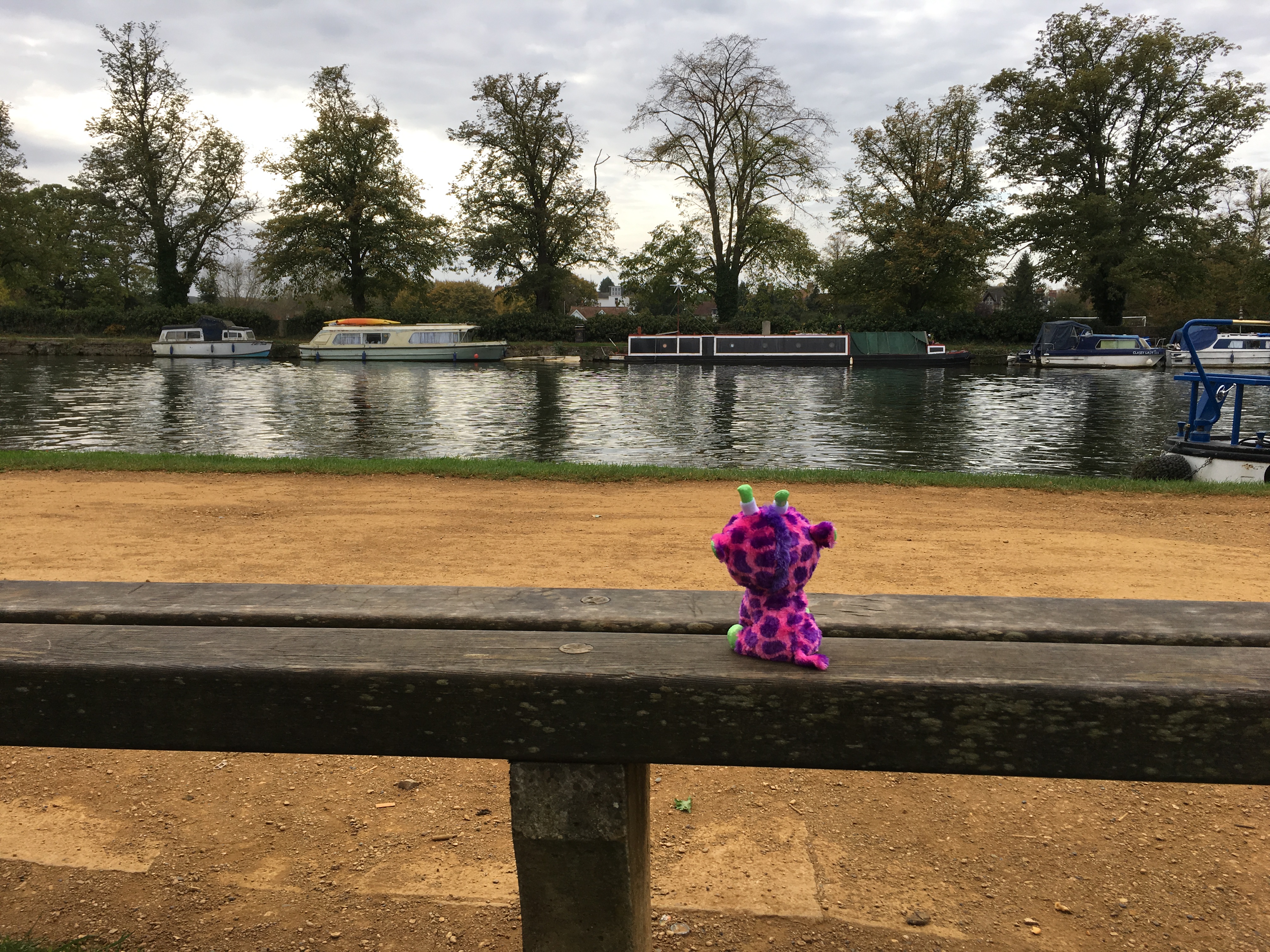The white cliffs of Dover do exist. The cliffs set against the blue-green sea must be a spectacular view from any boat in the constant line of vessels entering the harbor. It’s difficult to see the full impact from the Prince of Wales Pier, though, because massive ferries block the view. There are benches and alcoves set along the beachfront where a day is easily spent watching the ferries arriving from and departing for France. There’s usually a cruise ship docked for the day and fishing boats come and go. Beachfront in Dover is pleasant and peaceful and clean. I cannot say the same for the Dover city center. It is one of the sorriest places I’ve seen in my travels. And that’s why I ended up at the Waterfront Café looking for a burger.
The budget food choices in England are pies, or baguette sandwiches loaded with bacon, or questionable fish and chips. In Dover it seems that finding a restaurant that isn’t questionable is a search. I was hungry. So I found myself sitting at a table with two eighty-something women, one who had lived in Dover her entire life, and a gang of seagulls circling the table, ready to swoop in and grab a chip. One thing that is different here is that outside tables are not a breath of fresh air. They are taken up by people wanting to smoke. My companions ordered their tea and lit up and I learned quite a bit about Dover from my pensioners.
While I ate, the women kept the seagulls away from my plate and talked about their search for the best food in Dover. They wondered why they can’t find a decent Sunday roast anymore. One described the meal she’d had recently where “the Yorkshire pudding hadn’t risen and was so spongy”, she couldn’t get a fork into it and “the gravy was absolutely inedible”. But “so and so” has the most lovely lemon tart with the lightest meringue. They knew where to find the best scones. They talked about their own cooking and how they never wanted to use a dishwasher when their children were young because of the cost of the electrics.
They waited until my mouth was clear of burger, then answered my questions. What was the story of Dover? Why is there such a vagrancy problem – especially men? Doesn’t Dover benefit from the cruise ships that stop here? Who funds the Western Docks Revival project? (I’ll talk about this in another post).
Then the life-long resident told me about her experience as a child during WWII. Just around 21 miles from France, Dover was the place where the rescue of Dunkirk was planned and executed, but as a child, she was oblivious to that particular event. Her memories came from the eyes of a child and how the war disrupted her life. Many of her family’s experiences were shared by millions of other families across Europe. Much of what she told me is epitomized in the famous Keep Calm – Carry On (which, by the way, was never used as a slogan in its entirety during the war). We didn’t exchange names, so I’ll refer to her as Mrs. P.
Dover evacuated its children, but Mrs. P’s mother would not send her children away because she wanted everyone together if the worst happened. Two of Mrs. P’s brothers served in the Royal Navy, but the rest of her siblings stayed in Dover during the war. She remembered the harbor filled with ships and boats and she remembered ships burning in the water. It’s the sirens that pierce her memory. Dover was bombed over 450 times. The Germans also launched 2300 shells across the channel from Calais. During the war 10,000 buildings were destroyed or damaged. Dover’s casualties included 216 dead and over 750 injured.
Mrs. P told me about her brother Jimmy who experienced three torpedoes to his ship. The last one sunk it and he ended up being the only survivor because he switched bunks with one of his mates. I am trying to verify this story. She said her sister had all the newspaper accounts about it. She remembered visiting her brother in the hospital and how his hands were badly burned.
It doesn’t matter if Mrs. P’s recollections are accurate. She experienced quite a bit of the war in shelters and watching her neighbors lose their homes and businesses or their lives. Her brother dealt with his injuries for the rest of his life. Mrs. P spent her life as a foster mother, fostering a dozen children. She talked about the white wool hats she knits for premature babies. “Every baby,” she said, “should wear white.”
We gazed out onto the sea as the gulls moved on. Mrs. P said her son likes to visit her in her apartment overlooking the harbor, where he drinks coffee and watches all the people training for a chance to swim the Channel. I left thinking about the history of war for ports like Dover. It is steeped in a military history of defense. This place has had to keep one eye open to the sea for centuries. On a clear day, France is visible from Dover, but now Dover doesn’t worry about shells coming over the channel. They watch for the ships and ferries carrying tourists and for swimmers, both recreational and asylum-seeking.
And on a sunny day, the pensioners dress up and take a stroll down the promenade to look at the water whilst enjoying a cigarette and a cup of tea.































